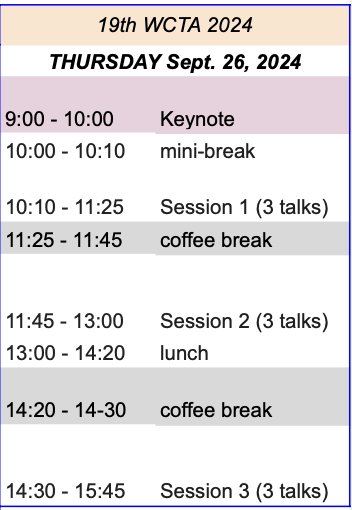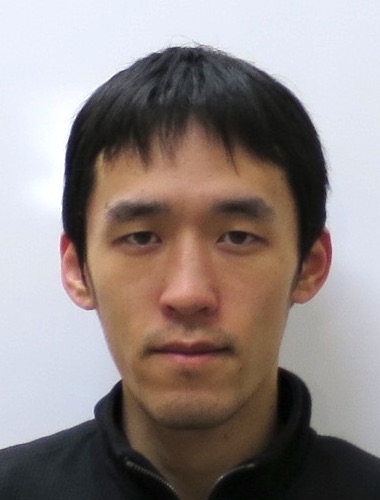19th Workshop on Compression, Text, and Algorithms (WCTA 2024)

THURSDAY
Session chair: Yuto Nakashima
Session chair: Giuseppe Romana
A unifying taxonomy of pattern matching in degenerate strings and founder graphs
Where the patterns are: repetition-aware compression for colored de Bruijn graphs
Near-Optimal Search Time in δ-Optimal Space, and Vice Versa
Session chair: Tomohiro I
Counting on General Run-Length Grammars
Space Efficiency in Grammar Compressed Strings with Bitpacking
Generalized Straight-Line Programs
Session chair: Gonzalo Navarro
New Properties of Fibonacci and Thue-Morse Words Resolve Conjecture on Net Frequency
Near-Optimal Time Construction of Minimum Wheeler DFAs
On computing the deterministic colex width of regular languages
Keynote Speaker
Constructing Compact Indexes for Parameterized Pattern Matching
A parameterized string (p-string) is a string over an alphabet (Σs ∪ Σp), where Σs and Σp are disjoint alphabets for static symbols (s-symbols) and for parameter symbols (p-symbols), respectively. Two p-strings x and y are said to parameterized match (p-match) if and only if x can be transformed into y by applying a bijection on Σp to every occurrence of p-symbols in x. P-matching has a wide range of applications in software maintenance, image processing, RNA structural matching, and so on, and thus, algorithms and data structures for p-matching have been extensively studied since Baker's seminal work [STOC 1993]. A popular problem is the indexing problem, in which we preprocess a p-string T of length n so that we can efficiently find the occurrences of substrings of T that p-match with a given pattern. Let σs and respectively σp be the numbers of distinct s-symbols and p-symbols that appear in T and σ = σs + σp. Extending the Burrows-Wheeler Transform (BWT) based index for exact string pattern matching, Ganguly et al. [SODA 2017] proposed parameterized BWTs (pBWTs) to design the first compact index for p-matching, and posed an open problem on how to construct the pBWT-based index in compact space, i.e., in O(n log σ) bits of space. Hashimoto et al. [SPIRE 2022] showed how to construct the pBWT for T, in O(n log σ) bits of space and O(n σp log n / log log n) time in an online manner while reading the symbols of T from right to left. In our recent paper [ICALP 2024], we refine Hashimoto et al.'s algorithm to run in O(n log σp log n / log log n) time. Our result has an immediate application to constructing parameterized suffix arrays in O(n log σp log n / log log n) time and O(n log σ) bits of working space. We also show that our data structure can support backward search, a core procedure of BWT-based indexes, at any stage of the online construction, making it the first compact index for p-matching that can be constructed in compact space and even in an online manner.
Tomohiro I
Kyushu Institute of Technology, Japan

